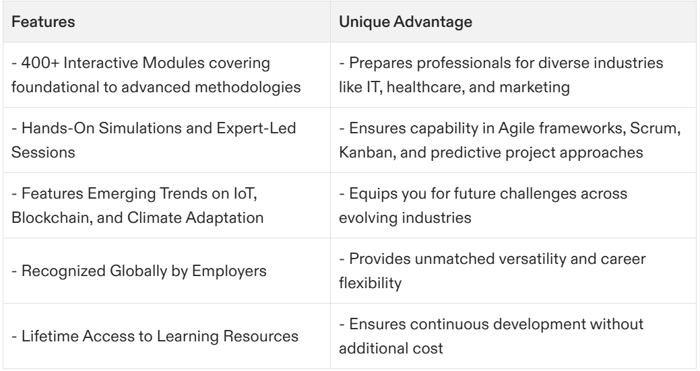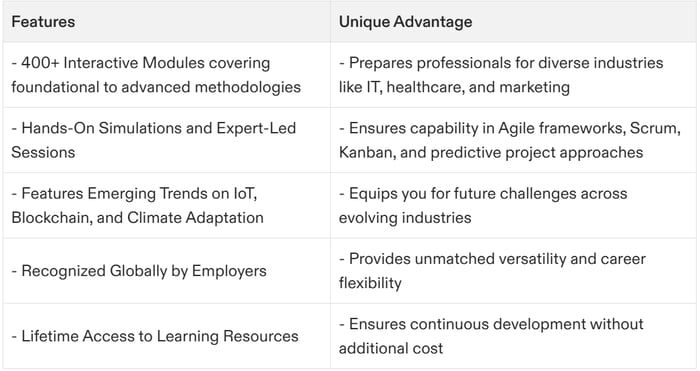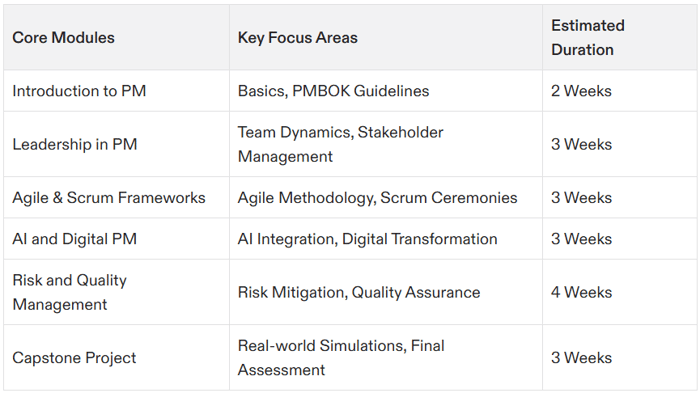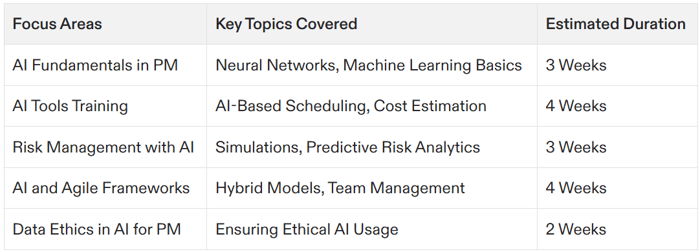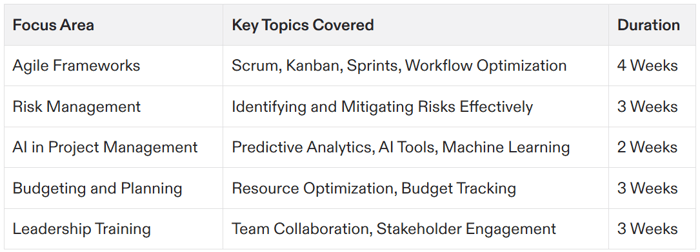Table of Contents
- Why Pursue a Project Management Certification?
- Steps to Getting Your Project Management Certification
- How to Get Project Management Certification?
- 1. Understand the Value of Certification
- 2. Choose the Certification That Aligns with Your Goals
- 3. Meet Prerequisites for Certification
- 4. Select the Right Training Program
- 5. Prepare for the Certification Exam
- 6. Take the Certification Exam
- 7. Maintain and Upgrade Your Certification
- Benefits of Understanding How to Get Project Management Certification and Getting Certified
- FAQ
-
- How to Get Project Management Certification? Check out APMIC Certification – Comprehensive Offerings
- Final Thoughts
Are you wondering how to get project management certification and what it can do for your career? You're not alone! Across industries, skilled project managers are the backbone of successful initiatives, ensuring tasks are completed on time, within budget, and to the highest quality. But in today’s competitive job market, having a project management certification isn’t just an asset—it’s a necessity. Beyond validating your expertise, it paves the way for global opportunities, higher salaries, and positions of leadership in industries ranging from IT and finance to healthcare and construction.
Why Pursue a Project Management Certification?
Project management certifications have become a necessity in the fast-paced business world. Whether you're advancing in your current role or shifting into a new career path, earning a professional certification can sharpen your skills, elevate your earning potential, and make you stand out in any industry. But how to get project management certification?
Steps to Getting Your Project Management Certification
How to Get Project Management Certification?
1. Understand the Value of Certification
A project management certification increases your credibility and demonstrates your ability to manage complex projects. For instance, APMIC certifications with 400+ modules provide practical knowledge, covering frameworks like Agile, Scrum, and Kanban, which are crucial in diverse industries like IT, finance, and healthcare.
Certifications like PMP, PRINCE2, or APMIC are globally recognized and directly contribute to higher salary negotiations.
2. Choose the Certification That Aligns with Your Goals
Your career goals should guide your choice of certification. Here’s a quick breakdown of notable options tailored to different professional needs.
- APMIC Certification: Offers comprehensive training with hands-on modules covering emerging technologies, ensuring you are job-ready in multiple industries. Learn about APMIC certification here.
- PMP Certification: Focused on project leadership and predictive methodologies, ideal for traditional project management environments.
- CAPM Certification: Entry-level certification for those new to project management.
- Agile and Scrum Certifications: Perfect for tech-centric roles requiring iterative project management approaches.
3. Meet Prerequisites for Certification
Most certifications have eligibility requirements. APMIC has a more accessible entry point for beginners, offering training that progresses from fundamentals to advanced project management techniques. PMP, on the other hand, requires prior project management experience.
4. Select the Right Training Program
Enrolling in a reliable training program is a crucial step if you want to ace your certification exam. Opt for programs that offer extensive learning resources, real-world simulations, and flexible study schedules. Programs like APMIC not only provide over 400 interactive modules but also focus on practical scenarios, helping bridge the gap between theory and application.
Programs such as APMIC also include tools like Gantt charts, Agile boards, and resource allocation trackers, giving you a professional toolkit that aligns with emerging industry standards.
5. Prepare for the Certification Exam
Preparation is the key to success. Here’s how to streamline your study routine:
- Master Core Concepts: Use guided materials provided by your course. APMIC integrates hands-on examples and case studies, making complex topics more approachable.
- Practice Exams: Familiarize yourself with the format and structure of the certification test.
- Leverage Study Groups: Collaborative learning with peers can clarify doubts and solidify understanding.
Start your preparation today with APMIC’s rich educational resources.
6. Take the Certification Exam
Once prepared, schedule your exam date at an accredited testing center or opt for an online option, depending on the certification. Make sure to arrive ready with the necessary IDs and focus on time management to complete the exam effectively.
7. Maintain and Upgrade Your Certification
Some certifications, like PMP, require recertification every few years. APMIC offers lifetime access to its learning modules, helping you stay updated on the latest trends and frameworks without additional costs.
Now that you know the steps and understand how to get project management certification let's explore the Benefits of getting project management certification.
Benefits of Understanding How to Get Project Management Certification and Getting Certified
Earning your project management certification has numerous advantages, including:
1. Higher Salary
Certified professionals earn up to 22% more than their non-certified peers. This pay increase reflects employers' recognition of the specialized skills and knowledge that certifications bring. For instance, professionals with APMIC certification often secure higher-paying roles in industries like IT, healthcare, and construction due to their practical expertise and advanced training.
2. Global Recognition
Certifications such as APMIC and PMP are respected worldwide by top employers, paving the way for international career opportunities. Having such a credential assures global organizations of your ability to lead and execute complex projects successfully. Imagine becoming a sought-after project manager for multinational corporations, thanks to your globally recognized certification.
3. Career Versatility
Project management certifications prepare you to manage projects across diverse industries, from tech startups to large-scale infrastructure projects. Programs like APMIC cater to the unique demands of fields like marketing, finance, and supply chain management, equipping you with adaptable, cross-sector skills. For instance, an APMIC-certified manager can excel equally in agile software development and hospital equipment procurement projects.
4. Improved Project Outcomes
Arming yourself with a certification means mastering the tools, frameworks, and methodologies needed to improve project efficiency. Whether it’s reducing resource wastage, streamlining workflows with Agile, or ensuring timely delivery, certified managers deliver consistently better results. Professionals trained under APMIC’s 400+ modules, which include advanced techniques like Gantt charts and Agile boards, often achieve significant project success metrics.
5. Enhanced Leadership Skills
Project managers are leaders, and certifications help refine your ability to lead teams effectively. Advanced certifications like APMIC go beyond technical skills to emphasize emotional intelligence, stakeholder engagement, and conflict resolution. These skills ensure you can inspire and guide your team, even under pressure, while delivering results aligned with organizational goals.
6. Networking Opportunities
Becoming certified connects you with a global community of like-minded professionals. Whether it's access to exclusive alumni networks, webinars, or industry events, networking opens doors to mentorship, career advice, and job opportunities. For instance, APMIC programs provide access to a network of project management experts who often share job postings, case studies, and strategic insights.
7. Future-Readiness
The business world is evolving, and staying ahead of trends is critical. Certifications like APMIC include emerging topics such as IoT, blockchain, AI, and sustainability, ensuring you’re ahead of the curve. Understanding these trends not only improves current project outcomes but also makes you a valuable asset for future innovations, preparing you for the jobs of tomorrow.
8. Faster Career Advancement
Certifications are often the key to breaking through career plateaus. Credentials like PMP or APMIC showcase your commitment to your professional growth, making you a top contender for promotions. For example, APMIC-certified professionals often move swiftly into leadership roles like Project Director or Portfolio Manager due to their advanced training and strategic mindset.
9. Enhanced Credibility and Trust
Having a certification on your resume signals dedication and expertise, instantly gaining the trust of clients, colleagues, and senior management. Many organizations prefer certified project managers for critical assignments, knowing they are well-equipped to handle high-pressure scenarios. Certifications like APMIC instill confidence in your skills, boosting workplace credibility.
10. Continual Skill Development
Certification programs don’t stop at the basics. Programs like APMIC offer lifetime access to evolving course materials, ensuring you’re always up to date with the latest project management tools and methodologies. This commitment to lifelong learning keeps you relevant in a rapidly shifting professional landscape.
FAQ
How to Get Project Management Certification?
Start by selecting a certification that matches your career goals (e.g., APMIC certification), meet the prerequisites, enroll in a training program, prepare thoroughly, and take the exam. Comprehensive programs like APMIC streamline this process into a single, learner-friendly package.
What is the easiest way to get certified in project management?
For beginners, programs like APMIC offer a flexible learning approach with beginner-friendly content. Their modular structure ensures that you can progress at your own pace, making it simpler to get certified.
Does a project management certification require prior experience?
Some certifications, like PMP, require prior experience, but others, like APMIC and CAPM, cater to beginners and professionals without extensive fieldwork.
How long does it take to get a project management certification?
It typically takes 8–12 weeks to complete most certification programs, depending on the course and individual pace. Programs like APMIC allow for flexible, self-paced learning, accommodating even the busiest schedules.
How much does a project management certification cost?
Certification costs vary widely, from $300 for beginner courses to $3,000 for advanced ones. APMIC integrates all essential learning tools into a transparent package, offering excellent value.
Are project management certifications worth it?
Absolutely. Certifications offer a competitive edge, higher earning potential, and enhanced skills applicable across industries. Programs like APMIC are especially valuable, as they are globally recognized and encompass advanced methodologies.
Can I get certified online?
Yes! Many certifications, including APMIC, offer an entirely online certification process, from courses to exams.
How often do I need to renew a project management certification?
Renewal periods differ by certification. PMP requires renewal every three years, but APMIC certification provides lifetime learning resources, reducing recertification challenges.
What tools will I learn during certification?
Certifications like APMIC train you in tools such as Jira, Gantt charts, Kanban boards, and Agile tracking systems, equipping you to tackle real-world project challenges effectively.
What industries value project management certifications?
Industries like IT, healthcare, marketing, construction, and finance all value certified project managers. Certifications like APMIC adapt to the unique demands of multiple sectors, ensuring maximum versatility.
How to Get Project Management Certification? Check out APMIC Certification – Comprehensive Offerings
Final Thoughts
Understanding how to get project management certification is the first step toward a successful project management career. From choosing the right program to exam preparation, every step matters. Programs like APMIC simplify the entire process by offering beginner-to-advanced training, exceptional support, and a globally recognized credential.
Did you you learn How to Get Project Management Certification? Invest in your career, and become the project manager every top company is looking for. Get started with APMIC today!

